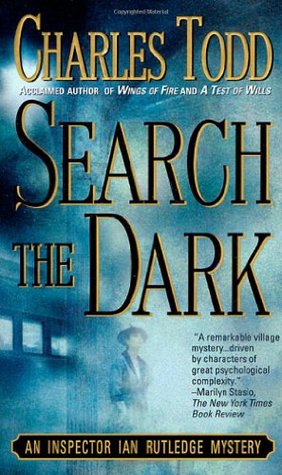 Search the Dark (Inspector Ian Rutledge, #3) by Charles Todd
Search the Dark (Inspector Ian Rutledge, #3) by Charles Todd Format: ebook
Source: borrowed from library
Formats available: hardcover, paperback, ebook, audiobook
Genres: historical fiction, historical mystery, mystery
Series: Inspector Ian Rutledge #3
Pages: 310
Published by St. Martin's Press on May 15, 2000
Purchasing Info: Author's Website, Publisher's Website, Amazon, Barnes & Noble, Kobo, Bookshop.org
Goodreads
The introspective hero of Wings of Fire and A Test of Wills (Edgar Award nominee) returns in Search the Dark, a provocative new mystery by Charles Todd. Inspector Ian Rutledge, haunted by memories of World War I and the harrowing presence of Hamish, a dead soldier, is "a superb characterization of a man whose wounds have made him a stranger in his own land." (The New York Times Book Review)
A dead woman and two missing children bring Inspector Rutledge to the lovely Dorset town of Singleton Magna, where the truth lies buried with the dead. A tormented veteran whose family died in an enemy bombing is the chief suspect. Dubious, Rutledge presses on to find the real killer. And when another body is found in the rich Dorset earth, his quest reaches into the secret lives of villagers and Londoners whose privileged positions and private passions give them every reason to thwart him. Someone is protecting a murderer. And two children are out there, somewhere, in the dark....
My Review:
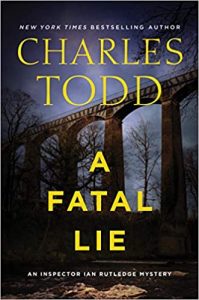 I picked this up because I was looking for a comfort read, as paradoxical as it is to find murder comfortable. Of course, I don’t find actual murder comfortable at all, but murder mysteries have to follow certain conventions – a body, a detective, a suspect, a few tasty red herrings – and I find that quite comfortable. I ended up here with Inspector Ian Rutledge because I just picked up a new book in the series (A Fatal Lie) and remembered that I was nowhere near caught up with him yet.
I picked this up because I was looking for a comfort read, as paradoxical as it is to find murder comfortable. Of course, I don’t find actual murder comfortable at all, but murder mysteries have to follow certain conventions – a body, a detective, a suspect, a few tasty red herrings – and I find that quite comfortable. I ended up here with Inspector Ian Rutledge because I just picked up a new book in the series (A Fatal Lie) and remembered that I was nowhere near caught up with him yet.
And I love the work of his creators, the mother-and-son writing team known as Charles Todd. So here we are.
One of the things that makes this series so fascinating is its atypical detective. The series takes place in the years following World War I. The events of Search the Dark occur in August of 1919, and the war is less than a year over at this point. Officially, the war ended in late June of 1919 with the signing of the Treaty of Versailles, so the semi-certainty of true peace has barely begun to settle.
The war is very present in this story, both in the continuing economic deprivations and the losses that are still fresh and grieved for. It is also literally present in the mind of Inspector Ian Rutledge, a man who continues to suffer from shell-shock and carries in his mind the voice of a young soldier he executed for dereliction of duty. Corporal Hamish MacLeod may have died in France, but he also lives in Ian’s mind as a voice that provides insights and recriminations by turns throughout the story.
This is also a story centered around the damage that the war inflicted on its survivors. War is always hell, but the so-called Great War, with its fatal gases and its endless trenches, seems to have been worse than most.
The effects linger most obviously around Ian, who constantly doubts himself, both in his own voice as well as that of Hamish, but also in the lives of three men in the tiny villages surrounding Singleton Magna in Dorset. One old soldier thinks he saw his dead wife and their two children. The woman he thought was his wife has been found dead by the side of the road. The local police want to believe he did it, because that makes their lives easier.
But the area holds two other men who came back from the war less than mentally whole. The late rector’s son and the late squire’s son don’t have much else in common, but when a second dead woman is discovered, that the new body has been in the ground for at least three months throws the comfortable theory about a stranger rampaging around the county out of the bounds of reasonable possibility.
That’s where Rutledge comes in. The longer he investigates, no matter how much the local police resent his presence, it’s clear that someone local has to be involved with the mini-crime spree.
And that just because a lot of people are throwing smoke at someone they dislike, doesn’t mean that that’s where the fire started.
Until an actual fire starts, and all of the comfortable theories burn to ash – along with more than a few lies – and lives.
Escape Rating A-: Part of that comfort in reading a murder mystery is that the reader knows at the beginning that whoever the initial suspect is – they didn’t do it. (Yes, there are rare occasions when they did, but they’re so rare that when it does happen it’s a shocker!)
It’s certainly true in this story that poor Bert Mowbray didn’t kill the woman. He certainly seems to have had a psychotic break – but it just doesn’t seem like THAT kind of break. Especially since the dead woman wasn’t his wife, who died along with both their children while he was somewhere in a trench in France.
But Singleton Magna is a small town and it would make everyone a hell of a lot more comfortable if the killer were a random stranger instead of someone local. But if the dead woman was Mowbray’s wife, and he really did see her and their two children as the train he was on rushed by, there’s a huge question remaining – what happened to those children?
It’s the pathos of those missing little ones that gets Scotland Yard involved, bringing Rutledge to Dorset to upset the settled case that the local inspector thinks he has all tied up with a neat bow. A bow that Rutledge immediately tries to untie.
In the search for those missing children, the case widens out to the nearby towns and villages. Only to discover that the woman the locals decided had to be Mrs. Mowbray is actually Margaret Tarlton. And that Margaret Tarlton had just interviewed for a position as a museum assistant with the local squire, Simon Wyatt.
And that’s where the case both reaches out to far off London and weaves its way into the life of the even tinier town of Charlbury, where that local squire came home from his war not quite the man he used to be, and with a French wife that the locals don’t like, don’t trust and would be willing to blame for anything – even murder.
The way that the spiral of lies, suspicions and half-truths winds its way around Aurore Wyatt was reminiscent of the “conviction by the mob” that occurred in A Pattern of Lies, part of the author’s Bess Crawford series.
 But what makes this series work is the dogged and tormented character of Inspector Ian Rutledge. He’s often caught between knowing that he’s right and fearing that he’s wrong. He’s afraid at every turn that he’ll fail, and that the result of that failure will condemn both an innocent and himself. He carries the seeds of his own destruction within himself, scared that others will see and judge him the less for them while knowing that they do. And yet, he can’t stop from trying, with every case, to reach for what is right. Even in a case like this one, where in the end his success has as many victims as his failure would have.
But what makes this series work is the dogged and tormented character of Inspector Ian Rutledge. He’s often caught between knowing that he’s right and fearing that he’s wrong. He’s afraid at every turn that he’ll fail, and that the result of that failure will condemn both an innocent and himself. He carries the seeds of his own destruction within himself, scared that others will see and judge him the less for them while knowing that they do. And yet, he can’t stop from trying, with every case, to reach for what is right. Even in a case like this one, where in the end his success has as many victims as his failure would have.
As I’m reaching the end of several of the other series I turn to when I’m looking for a comfort read, I know that I’ll be back to catch up with Inspector Ian Rutledge the next time I’m looking for a spot of murder to bring me back to reading life. I’m looking forward to picking up Legacy of the Dead when that happens.

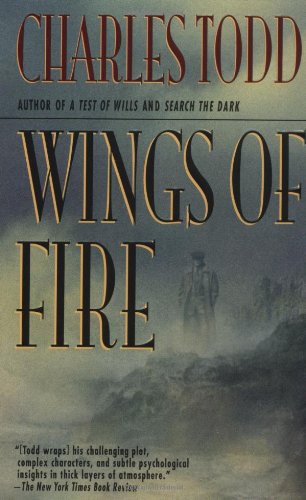 Wings of Fire (Inspector Ian Rutledge, #2) by
Wings of Fire (Inspector Ian Rutledge, #2) by 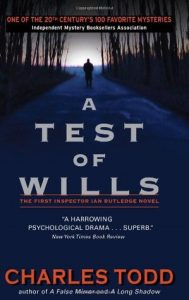 I’ve been looking for comfort reads this week, and that has led me to take a look at some mystery series that I’ve been meaning to get caught up on. Today, that led me to Wings of Fire, the second book in Charles Todd’s
I’ve been looking for comfort reads this week, and that has led me to take a look at some mystery series that I’ve been meaning to get caught up on. Today, that led me to Wings of Fire, the second book in Charles Todd’s 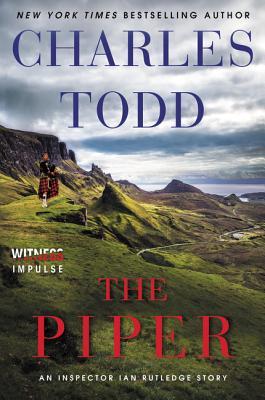 The Piper: An Inspector Ian Rutledge Story by
The Piper: An Inspector Ian Rutledge Story by 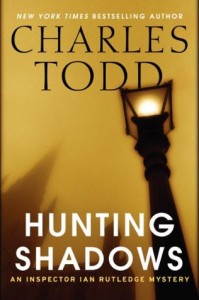 Hamish is an interesting character, whether readers are familiar with the series or not. I’ve read the first book (
Hamish is an interesting character, whether readers are familiar with the series or not. I’ve read the first book (